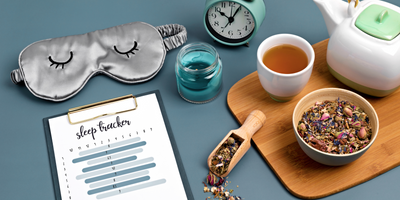
Productivity and Performance: How Sleep Quality Boosts Your Efficiency
The Connection between Sleep Quality and Productivity
We live in a world obsessed with productivity, with ever-growing pressure to accomplish more tasks in less time. However, one crucial aspect often overlooked in our pursuit of efficiency is the quality of our sleep. Studies have shown a profound connection between sleep quality and productivity, and understanding this link can significantly enhance our performance at work and in life.
Poor sleep has been associated with reduced alertness, impaired decision-making, and decreased ability to concentrate and learn. These are all factors that directly impact productivity. If you've ever found it challenging to focus on a task after a poor night's sleep, you've experienced this firsthand.
Furthermore, the impact of sleep on our productivity is not just about the number of hours slept but about the quality of those hours. Research indicates that deep, uninterrupted sleep helps rejuvenate the brain, improve mood, and bolster energy levels, which translates into enhanced productivity.
However, balancing quality sleep with work demands and other responsibilities can be challenging. An individual's ability to be productive can be affected by numerous external and internal factors, including stress, physical health, and environmental conditions. Striking a balance requires awareness, intentionality, and a willingness to make sleep a priority.
Understanding the Impact of Sleep on Performance
Sleep doesn't just affect our productivity; it also profoundly influences our overall performance. Lack of adequate sleep has been linked with decreased cognitive function, poor emotional regulation, increased stress levels, and other issues that can hinder our performance in different areas of life.
A significant impact of poor sleep is on our cognitive abilities. Sleep deprivation affects our attention span, reasoning, problem-solving, and memory. It reduces our ability to handle complex tasks and make quick decisions – key components of performance in today's fast-paced work environments.
Moreover, chronic sleep deprivation can have serious health consequences, including an increased risk of cardiovascular disease, diabetes, and obesity. These health issues can further degrade performance by reducing physical stamina and exacerbating mental health issues like depression and anxiety.
Yet, many people still undervalue sleep in their quest for peak performance. The challenge here is changing this mindset and recognizing that adequate sleep is not a luxury but a necessity for optimal performance. It's about understanding that to perform at our best, we need to take care of our bodies and minds, and that starts with getting a good night's sleep.
The Science Behind Sleep and Cognitive Function
Sleep is not just a period of rest; it's an active state during which essential processes affect our cognitive function. Scientifically, sleep is divided into several stages, each playing a different role in maintaining and enhancing our cognitive abilities.
The deep stages of sleep, known as slow-wave sleep, are associated with memory consolidation – the process by which new information is transferred from short-term to long-term memory. During this stage, the brain replays the day's experiences and learning, reinforcing the neural pathways and making the information more accessible in the future.
Additionally, the rapid eye movement (REM) stage of sleep, often associated with dreaming, has been linked to creativity and problem-solving abilities. It's during this stage that our brain integrates and connects unrelated ideas and concepts, leading to innovative thinking and creative insights.
Sleep deprivation hampers these essential cognitive processes, so after a poor night's sleep, you may find it difficult to recall information, solve problems, or develop new ideas. Prioritizing quality sleep allows these cognitive processes to occur uninterrupted, enhancing our cognitive function and ultimately boosting our productivity and performance.
Sleep Deprivation: The Hidden Enemy of Productivity
Sleep deprivation is often the unsung villain in our stories of decreased productivity. Unfortunately, it's a widespread issue in modern societies. Long work hours, digital distractions, and stress are some of the common factors leading to sleep deprivation.
When deprived of sleep, the brain's ability to function optimally deteriorates. Prolonged sleep deprivation can lead to reduced concentration, impaired memory, and slowed reaction times, directly impacting productivity. Moreover, chronic sleep deprivation can affect our mood and emotional well-being, leading to symptoms of anxiety and depression, which further impact productivity and performance.
The challenge lies in recognizing the signs of sleep deprivation and taking action before it significantly impairs our productivity. We often underestimate the extent of our sleep deprivation and its impact on our performance, pushing ourselves to continue working when we would be better off getting some rest.
How Adequate Sleep Improves Concentration and Focus
Our brain functions differently during sleep, carrying out essential tasks that help improve our concentration and focus. During sleep, our bodies may be resting, but our brains are busy processing the day's information, forming new neural pathways, and preparing us for the challenges of the following day.
One of the significant impacts of quality sleep is on our attention span. Adequate sleep enables us to maintain focus on tasks without easily getting distracted, helping us work more efficiently. This is particularly crucial in tasks requiring a high level of precision or where mistakes can have significant consequences.
Moreover, a well-rested brain has an easier time dealing with distractions, multitasking, and switching between tasks – all important skills in today's dynamic and fast-paced work environments. By improving our sleep quality, we can enhance our cognitive flexibility, enabling us to adapt more quickly and effectively to changes in our environment or task requirements.
However, getting quality sleep for improved focus and concentration is easier said than done, particularly in our increasingly connected and fast-paced world. It requires conscious choices about our sleep habits, lifestyle, and work-life balance.
Enhancing Creativity and Problem-Solving Skills through Better Sleep
Sleep has a profound impact on our creativity and problem-solving skills. The REM phase of sleep, during which most dreaming occurs, has been linked to enhanced creativity, increased problem-solving ability, and better emotional and procedural memory.
During REM sleep, our brains are particularly active, processing information from the day and forming new connections between unrelated ideas. This process can stimulate creative thinking and help us develop innovative solutions to problems.
Moreover, sleep aids in cognitive flexibility, which is the ability to switch between different concepts or perspectives. This flexibility is crucial for creative thinking and problem-solving, allowing us to see things from different angles and develop novel solutions.
However, balancing the need for quality sleep with the demands of a busy schedule can be challenging. It involves making sleep a priority and recognizing the importance of rest in fueling our creative and problem-solving abilities.
The Role of Sleep in Memory Consolidation and Learning
One of the most significant roles of sleep is in memory consolidation – the process by which short-term memories are transformed into long-term ones. During sleep, particularly the deep stages of sleep, our brains replay the day's events and reinforce the neural pathways associated with these memories.
This process is crucial for learning. Whether studying for an exam, learning a new skill, or trying to remember important information for a work presentation, getting enough sleep can significantly improve our ability to recall this information later.
Moreover, research has shown that sleep can enhance our ability to learn new motor skills. For instance, if you're learning to play a musical instrument or practicing a new sport, your performance may improve after a good night's sleep.
Despite the crucial role of sleep in memory and learning, it's often neglected, particularly in high-pressure environments like schools and workplaces. The challenge is to create an environment that respects and supports the necessity of quality sleep for optimal learning and memory consolidation.
Tips for Optimizing Your Sleep Quality
Improving your sleep quality is vital in boosting your productivity and performance. One way to achieve this is by practicing good sleep hygiene. This involves creating a sleep-friendly environment and establishing habits that promote quality sleep.
Firstly, make your bedroom a sleep sanctuary. Keep it cool, quiet, and dark. Use earplugs, an eye mask, or a white noise machine if necessary. Invest in a comfortable mattress and pillows, and use your bed for sleep and sex only, not for work or entertainment.
Secondly, establish a regular sleep schedule. Try to go to bed and wake up simultaneously every day, even on weekends. This helps regulate your body's internal clock, making it easier to fall asleep and wake up.
Thirdly, limit exposure to screens before bed. The light emitted by phones, tablets, and computers can interfere with the production of melatonin, the hormone that regulates sleep.
Lastly, be mindful of your diet and exercise. Avoid large meals, caffeine, and alcohol close to bedtime, and try to get regular physical activity. Just be sure not to exercise too close to bedtime, as this can interfere with sleep.
While these tips can improve sleep hygiene, it's important to remember that everyone is different. What works for one person may not work for another. Therefore, finding a routine that suits your needs and lifestyle is essential.
Establishing a Bedtime Routine for Enhanced Productivity
A regular bedtime routine can significantly improve your sleep quality and, in turn, your productivity. This routine signals to your body that it's time to wind down and prepare for sleep, making it easier to fall asleep and stay asleep throughout the night.
Your routine might include reading a book, taking a warm bath, practicing mindfulness meditation, or writing in a journal. The key is to find activities that help you relax and prepare your body and mind for sleep.
Incorporating relaxation techniques into your bedtime routine can also be beneficial. Techniques such as progressive muscle relaxation, deep breathing, and visualization can help reduce stress and anxiety, promoting better sleep.
However, establishing and maintaining a regular bedtime routine can be challenging, particularly with work, family, and social life demands. It requires discipline, consistency, and a commitment to making sleep a priority.
Investing in Your Performance and Success
Understanding the critical role of sleep in productivity and performance is the first step. The next step is making sleep a priority. This is an investment in your success, health, and well-being.
Making sleep a priority means setting boundaries around your work and social life to ensure you get the rest you need. It may involve saying no to late-night social engagements, turning off electronic devices an hour before bedtime, or resisting the urge to work late into the night.
While these changes may be challenging, the payoff regarding enhanced productivity, improved performance, and better health is significant. When well-rested, we think more clearly, make better decisions, and are more creative and efficient.
Investing in sleep is investing in yourself. By prioritizing sleep, you are not only boosting your productivity and performance, but you're also improving your overall health and quality of life.
In conclusion, sleep is not just a biological necessity; it's a key ingredient in our quest for greater productivity and performance. Understanding the connection between sleep and cognitive function, recognizing the detrimental effects of sleep deprivation, and implementing strategies to improve sleep quality can enhance our efficiency, creativity, and success.
Deep Sleep Support
We’ve created a Deep Sleep Supporting supplement with a combination of the best available ingredients proven to assist in a better night’s sleep. This supplement is an easy-to-mix, great-tasting powder, offering a therapeutic dose of the nutrients your body needs to relax and fall asleep. Learn more about it here.







